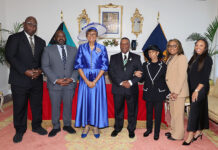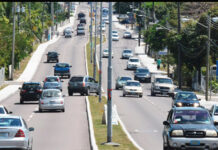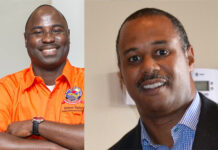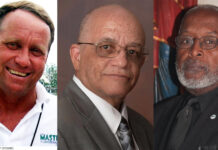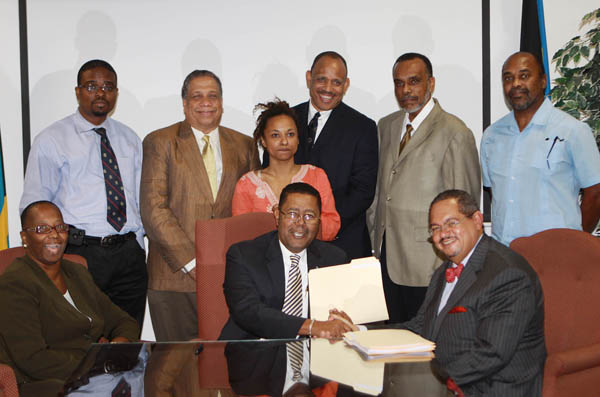
NASSAU, The Bahamas — The National Task Force on Stem Cell Therapy Treatment has recommended to th e Bahamas Government that embryonic stem cells should not be used to create human stem cells in this country, said the Task Force’s chairman and managing director of the Cancer Centre, Professor Arthur T. Porter.
Professor Porter presented a copy of the Task Force’s recommendations to Minister of Health the Hon. Dr. Perry Gomez during a press conference held at the Ministry of Health, Thursday, December 27, 2012.
The Chairman told Dr. Gomez that the Task Force’s members unanimously support all of the recommendations within the report.
In November 2012, the Bahamas Government appointed the Task Force to develop a series of recommendations regarding the possible use of Stem Cell Therapy in The Bahamas
The Committee had to weigh all the pros and cons associated with Stem Cell use, including the more controversial use of embryonic Stem Cells. The Task Force also had to look at how adult Stem Cells would be used.
Members of the Task Force include Dr. Robin Roberts, Director, University of the West Indies School of Clinical Medicine and Research, Bahamas Campus; Rev. Angela Palacious, Anglican Archdiocese; Dr. Duane Sands, Senior Cardiovascular Surgeon, Princess Margaret Hospital; Dr. Paul Ward, Chief of Services, Rand Memorial Hospital, Grand Bahama; Dr. Barrett McCartney, Senior Anaesthesiologist and Pain Specialist, Doctors Hospital and Dr. Indira Martin, Laboratory Research, Ministry of Health.
Dr. Wesley Francis, President of the Medical Association of The Bahamas; Dr. Glen Beneby, Medical Director, Public Hospitals Authority and Mrs. Michelle Pindling-Sands, Attorney-at-law, also sit on the Task Force.
When the Task Force was first introduced, Professor Porter explained that there are two types of stem cells.
“Embryonic cells usually derive from a five-day em bryo or earlier, which have the ability to become any cell in the body whether a brain cell, a fat cell or a nerve cell. They are pluripotent (capable of differentiating into one of many cell types).
“The second type are the adult stem cells, which are smaller in quantity and can be found in most tissue and organ systems, but which lack the flexibility of what they can be, and so scientist have tried to take some of the adult Stem Cells and make them able to be more or less like embryonic stem cells to sort of get around the problem.”
Professor Porter explained that during the Task Force’s deliberations, it was found that there is no need for the use of embryonic Stem Cells, because research is finding that adult Stem Cells can be transformed to be able to act as Induced Pluripotent Stem Cells.
As a result, he said there is no need to focus on embryonic stem cells in The Bahamas.
Professor Porter said the use of umbilical cord blood, which has been used for over 15 years in different parts of the world, should also be permitted in The Bahamas.
“The use of somatic cell nuclear transfer, which is a type of technique in which adult Stem Cells are encouraged to behave, as early Stem Cells should also be used.
“But again recognising that we are on the frontiers of new science, so the appropriate clinical trials, the appropriate committees, the appropriate ethics support should be given to the use of these areas.”
Professor Porter said many have asked the Task Force for an opinion regarding reproductive human cloning. “The Task Force was quite committed in its opinion that reproductive cloning should not be permitted.”
He added that the Task Force felt that it was important that there be widespread education and consultation with various stakeholder groups that will be involved in making the ultimate decision, so people would become aware of the importance of Stem Cells, some of the ethical issues and be able to opine in this regard.
Professor Porter said the Task Force believed that Stem Cells would be an important part of the country’s medical tourism thrust, but the Government needs to broadly review what is necessary for a successful medical tourism industry.
Dr. Sands added, “We have to understand that this is a rapidly evolving field and there are many countries in the world that have embraced medical tourism and as such have tried desperately to ensure the process of approval or the rapid acceleration of new projects is done in a timely fashion.
“Similarly, efforts have been made to ensure that phenomenal scrutiny of the proposed projects, the participants, etc., is carefully done.
He said legislation in The Bahamas has to be robust enough to protect the integrity and the reputation of the country while at the same time promoting good science and this is an on-going process. “We need to make sure the laws are constantly keeping up with what is happening on the ground.”
Dr. Gomez said after he reviews the report, he would present it to Cabinet early next year so that policies can be made surrounding Stem Cell Therapy in the country.



